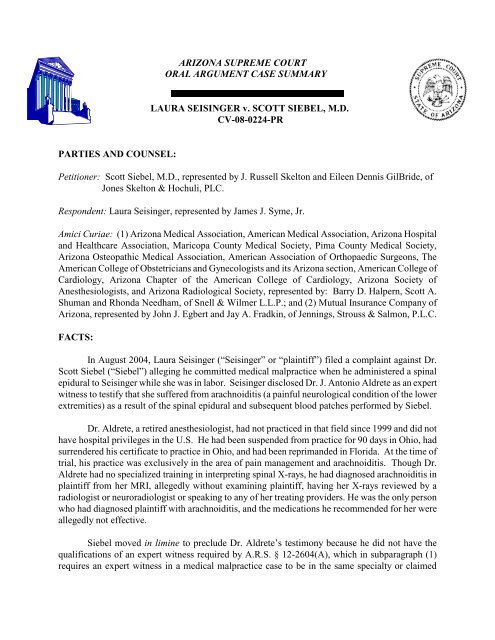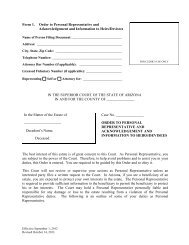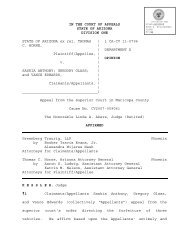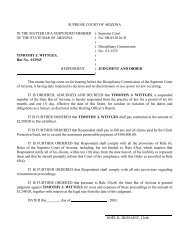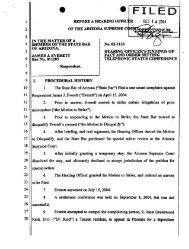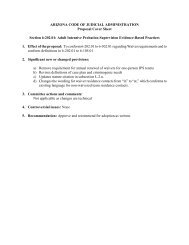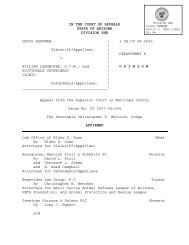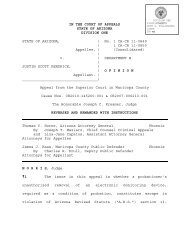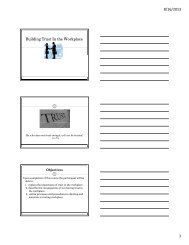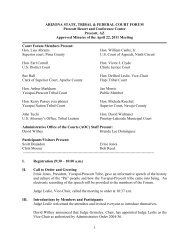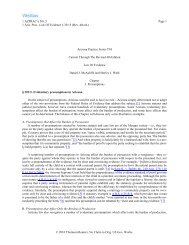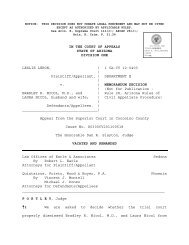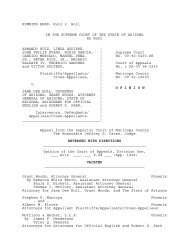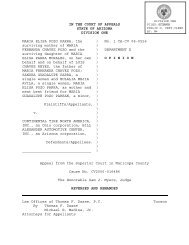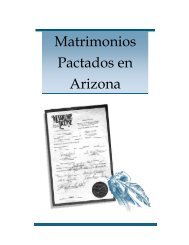CV-08-0224-PR
CV-08-0224-PR
CV-08-0224-PR
You also want an ePaper? Increase the reach of your titles
YUMPU automatically turns print PDFs into web optimized ePapers that Google loves.
PARTIES AND COUNSEL:<br />
ARIZONA SU<strong>PR</strong>EME COURT<br />
ORAL ARGUMENT CASE SUMMARY<br />
LAURA SEISINGER v. SCOTT SIEBEL, M.D.<br />
<strong>CV</strong>-<strong>08</strong>-<strong>0224</strong>-<strong>PR</strong><br />
Petitioner: Scott Siebel, M.D., represented by J. Russell Skelton and Eileen Dennis GilBride, of<br />
Jones Skelton & Hochuli, PLC.<br />
Respondent: Laura Seisinger, represented by James J. Syme, Jr.<br />
Amici Curiae: (1) Arizona Medical Association, American Medical Association, Arizona Hospital<br />
and Healthcare Association, Maricopa County Medical Society, Pima County Medical Society,<br />
Arizona Osteopathic Medical Association, American Association of Orthopaedic Surgeons, The<br />
American College of Obstetricians and Gynecologists and its Arizona section, American College of<br />
Cardiology, Arizona Chapter of the American College of Cardiology, Arizona Society of<br />
Anesthesiologists, and Arizona Radiological Society, represented by: Barry D. Halpern, Scott A.<br />
Shuman and Rhonda Needham, of Snell & Wilmer L.L.P.; and (2) Mutual Insurance Company of<br />
Arizona, represented by John J. Egbert and Jay A. Fradkin, of Jennings, Strouss & Salmon, P.L.C.<br />
FACTS:<br />
In August 2004, Laura Seisinger (“Seisinger” or “plaintiff”) filed a complaint against Dr.<br />
Scott Siebel (“Siebel”) alleging he committed medical malpractice when he administered a spinal<br />
epidural to Seisinger while she was in labor. Seisinger disclosed Dr. J. Antonio Aldrete as an expert<br />
witness to testify that she suffered from arachnoiditis (a painful neurological condition of the lower<br />
extremities) as a result of the spinal epidural and subsequent blood patches performed by Siebel.<br />
Dr. Aldrete, a retired anesthesiologist, had not practiced in that field since 1999 and did not<br />
have hospital privileges in the U.S. He had been suspended from practice for 90 days in Ohio, had<br />
surrendered his certificate to practice in Ohio, and had been reprimanded in Florida. At the time of<br />
trial, his practice was exclusively in the area of pain management and arachnoiditis. Though Dr.<br />
Aldrete had no specialized training in interpreting spinal X-rays, he had diagnosed arachnoiditis in<br />
plaintiff from her MRI, allegedly without examining plaintiff, having her X-rays reviewed by a<br />
radiologist or neuroradiologist or speaking to any of her treating providers. He was the only person<br />
who had diagnosed plaintiff with arachnoiditis, and the medications he recommended for her were<br />
allegedly not effective.<br />
Siebel moved in limine to preclude Dr. Aldrete’s testimony because he did not have the<br />
qualifications of an expert witness required by A.R.S. § 12-2604(A), which in subparagraph (1)<br />
requires an expert witness in a medical malpractice case to be in the same specialty or claimed
specialty or be board certified in the same specialty (if the party claims to be board certified), as the<br />
party testified for or against. In addition, under subparagraph (2), the witness must have<br />
[d]uring the year immediately preceding the occurrence giving rise to<br />
the lawsuit, devoted a majority of the person’s professional time to<br />
either or both of the following:<br />
(a) The active clinical practice of the same health profession as the<br />
defendant and, if the defendant is or claims to be a specialist, in<br />
the same specialty or claimed specialty.<br />
(b) The instruction of students in an accredited health professional<br />
school or accredited residency or clinical research program in the<br />
same health profession as the defendant, and if the defendant is or<br />
claims to be a specialist, in an accredited health professional<br />
school or accredited residency or clinical research program in the<br />
same specialty or claimed specialty.<br />
In opposition to the motion, Seisinger conceded her expert’s lack of the above<br />
qualifications but argued that the statute was unconstitutional because it was a procedural<br />
enactment in direct conflict with a procedural rule of court, Rule 702, Rules of Evidence.<br />
In response, Dr. Siebel argued that the statute was constitutional as a procedural<br />
enactment consistent with the court rule. He did not argue that the statute was a substantive<br />
rather than procedural enactment. The trial court granted the defendant’s motion and ruled<br />
the statute did not violate the separation of powers doctrine or detract from the court’s ability<br />
to apply Rule 702. When Seisinger failed to locate a new expert after being given an<br />
extension of time to do so, the court granted Siebel’s motion to dismiss. Seisinger appealed.<br />
The Court of Appeals held that A.R.S. § 12-2604(A) was “unconstitutional because it<br />
violates the separation of powers provision of the Arizona Constitution” by setting “stricter<br />
limits than Rule 702 on qualifications for an expert witness in medical malpractice cases and<br />
thus is in direct conflict with Rule 702.”<br />
The Court further found the statute was procedural rather than substantive because it<br />
does not “establish any new rights or reflect considerations creating, defining or regulating<br />
the right to bring a medical malpractice case, but merely prescribes the method by which<br />
existing rights may be enforced – changing the qualifications necessary to testify as an expert<br />
in a medical malpractice claim.” Therefore, the statute violated the constitutional separation<br />
of powers doctrine of the Arizona Constitution, the Court of Appeals held.<br />
2
ISSUE:<br />
The judgment of the trial court was reversed and the case remanded for further<br />
proceedings. Dr. Siebel petitioned for review.<br />
“Did the Court of Appeals err in ruling A.R.S. §12-1604 unconstitutional?”<br />
This Summary was prepared by the Arizona Supreme Court Staff Attorneys’ Office solely for<br />
educational purposes. It should not be considered official commentary by the court or any member<br />
thereof or part of any brief, memorandum or other pleading filed in this case.<br />
3


